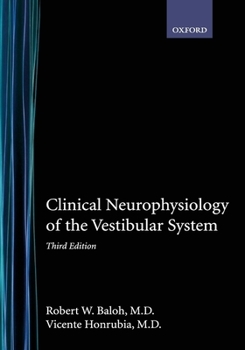Clinical Neurophysiology of the Vestibular System
The vestibular system plays a crucial role in enabling a person to remain oriented and move through his environment successfully. Dysfunction of this complex system may leave a patient totally disabled. "Dizziness" is a complaint commonly heard by neurologists, otolaryngologists, and other health care providers, yet its origins are many and often difficult to pinpoint and to treat. Clinical Neurophysiology of the Vestibular System is a classic text that provides a framework for understanding the pathphysiology of diseases involving the vestibular system. Part I reviews the anatomy and physiology of the vestibular system, with emphasis on clinically relevant material. Part II outlines important features in the patient's history, examination, and laboratory evaluation. Part III presents differential diagnostic points that help the clinician decide on the cause and treatment of the patient's problem. Part IV is a new section on the symptomatic treatment of vertigo. The third edition is thoroughly revised and has been expanded, covering the rapid advances that have occurred in the field in the last ten years. There are new chapters on the laboratory diagnosis of vestibular dysfunction, migraine, immune-mediated disorders, inherited disorders, symptomatic treatment of vertigo, antiemetic and antivertigo drugs, and vestibular rehabilitation.
Format:Hardcover
Language:English
ISBN:0195139828
ISBN13:9780195139822
Release Date:August 2001
Publisher:Oxford University Press, USA
Length:432 Pages
Weight:2.40 lbs.
Dimensions:0.9" x 9.8" x 6.6"
Customer Reviews
1 rating
Great Textbook for Audiologists in an AuD Program
Published by Thriftbooks.com User , 15 years ago
This was an assigned textbook for a balance assessment course in my AuD online program. Gets a bit deep in places, but generally pretty readable for audiologists learning/performing balance assessment.





